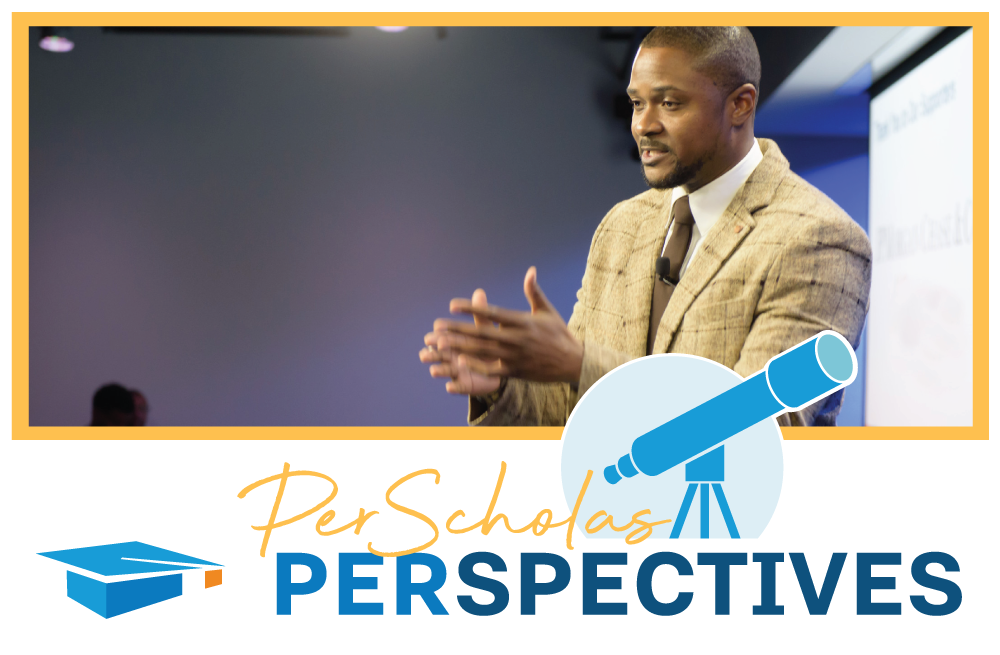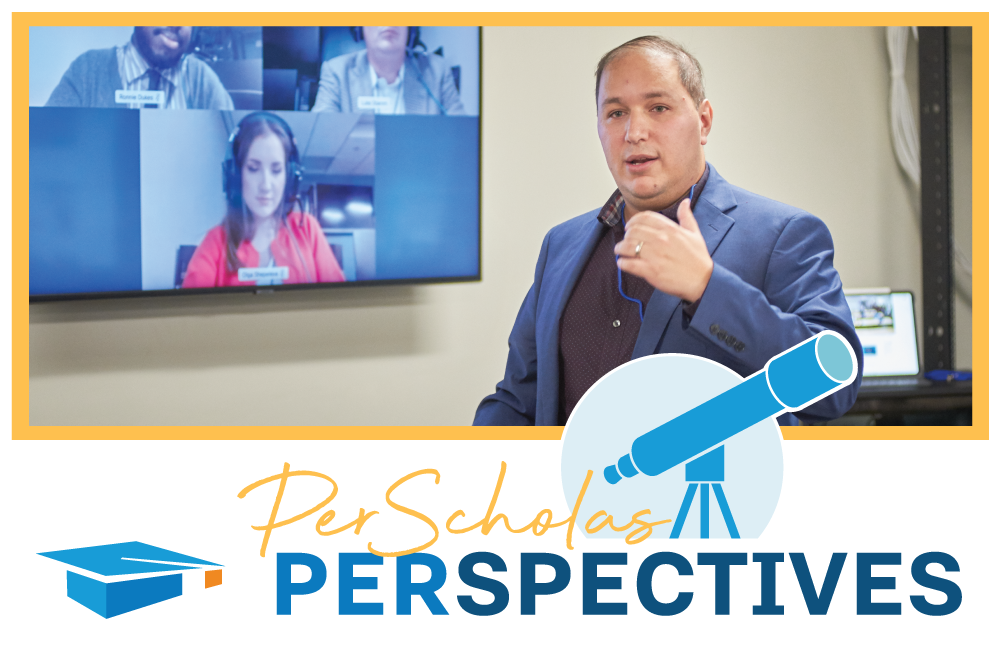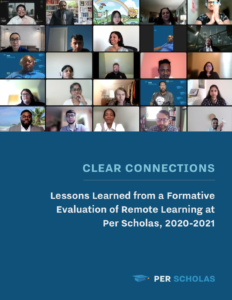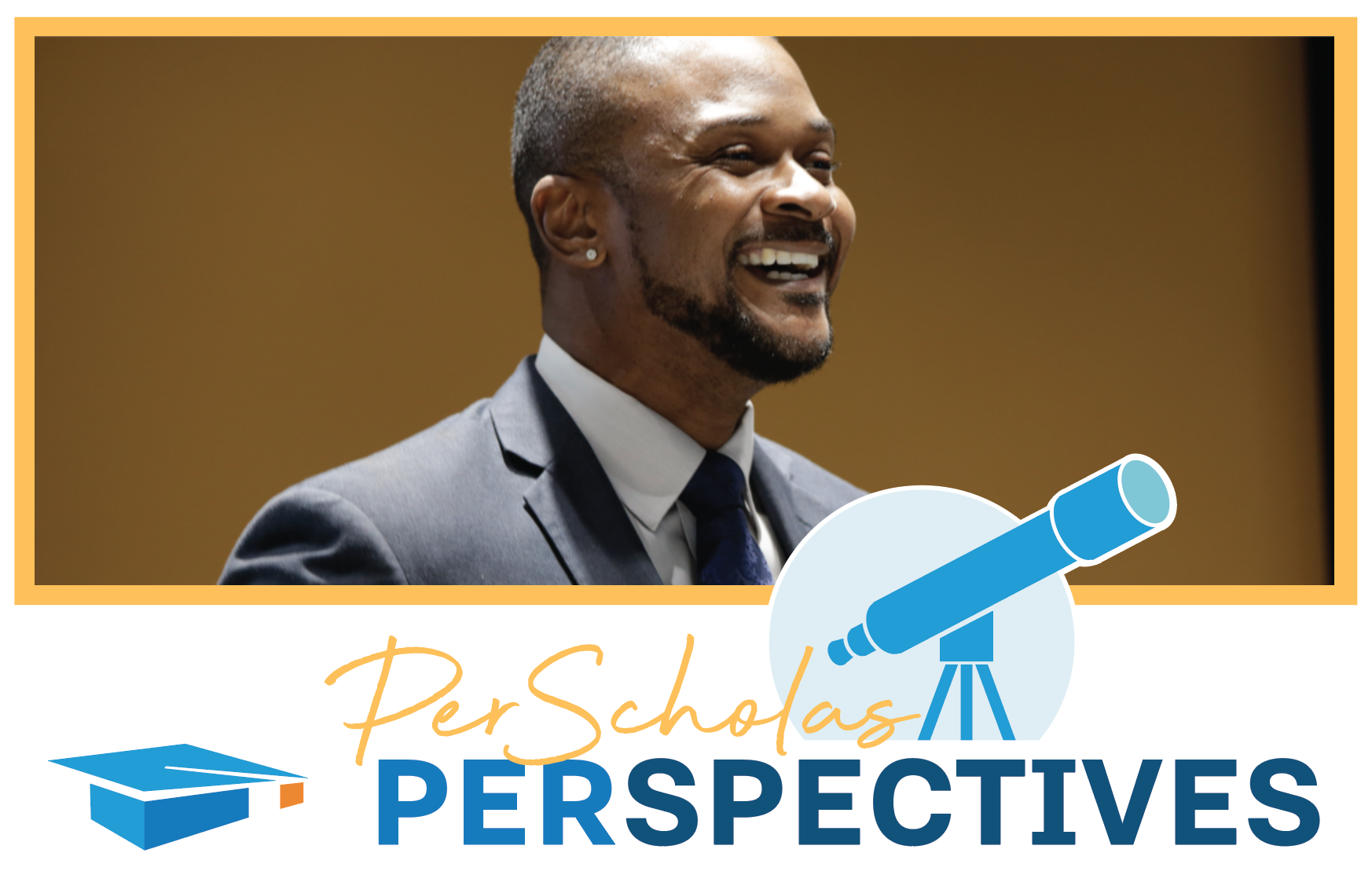Partnering for Impact: The Per Scholas Satellite Model
Following Your North Star

Following Your North Star
by Damien Howard
Chief Enterprise Solutions Officer
In my role as Chief Enterprise Solutions Officer, I often talk to C-Suite leaders, and one of the top challenges that always arises is hiring and retaining diverse tech talent. According to McKinsey & Company, inclusive teams make better decisions up to 87 percent of the time, and diverse teams produce a minimum of 19 percent more revenue. The business case and ROI for diversity has never been stronger or more urgent.
In my conversations with C-Suite Leaders, I also often get asked about what to do when an organization struggles with diverse hiring. They ask me how to catch up. My response is always to start with listening, learning, and then you must move to action! I also just heard a great quote from a phenomenal leader at E&Y in response to this question and he said, “You need to take luck out of the process when hiring diverse candidates.”
North Star Luminaries
Recently, I had the distinct privilege of honoring four leaders with our Diverse by Design North Star Award. Much like the North Star, this collection of leaders serves as a beacon for others to follow in their Diversity, Equity, Inclusion, and Belonging (DEIB) journey. Their commitment to DEIB and diversity hiring is bright and inspirational.
Among this year’s recipients was @Michael Buckham-White, Global Managing Director at @Deloitte Technology and Chairperson of the @ ITSMF Board. Michael takes on the role of Global Managing Director for Deloitte Technology and leads Global Consulting, Advisory, and Brand technology efforts. He ensures customers get the best of IT across a broad suite of capabilities, and serves as the single point of contact on technology needs. I’ve been lucky enough to see Michael in action at ITSMF for the last couple of years and have been able to see his impact in DEIB firsthand. Michael is known across multiple industries and has even been acknowledged by Savoy magazine as one of the 300 Most Influential Black Executives in Corporate America.
I presented the next Diverse by Design North Star Award to @Stephen DeStefani, SVP of Technology Diverse Segments, Representation & Inclusion at @Wells Fargo. In his role, he established and leads Wells Fargo’s first Neurodiversity Program and currently leads the Enterprise Technology efforts to hire more than 300 neurodiverse candidates by the end of 2022. He also led the effort to re-establish the Diversity Equity & Inclusion program for the Technology organization and built the operational framework for all diverse workstreams for the program. Stephen is also the executive sponsor that pushed Per Scholas’ customized talent development solution forward at Wells Fargo. We are now on our fourth training cohort and we are slated to launch three more in 2023. Stephen is a champion for DEIB.
Our third Diverse by Design North Star honoree was @Janet Pope, Vice President of Corporate Social Responsibility at @Capgemini Global Consulting Group. In her role, Janet is responsible for continuing to cultivate a culture of inclusion at Capgemini by developing, leading, and implementing workforce engagement strategies and programs that align directly with the business strategy, support people, protect the planet, grow partnerships, and embody overarching corporate values. To date, Capgemini has hired more than 80 Per Scholas graduates.
And finally, we honored @Pittsburgh Steelers Head Coach Mike Tomlin with the North Star Award. His commitments to the @NFL kept him in Pittsburgh, but my Diverse by Design Co-Founder Ken Walker and I had the chance to meet Coach on his home turf to present him with his award. Take a look here. As one of five minority head coaches in the NFL, Coach Tomlin is a passionate advocate for DEIB. He actively promotes racial equity and intentional progress around challenges attached to diversity, equity, inclusion, and belonging. Coach Tomlin is a tenacious leader, showing this generation just what’s possible.
Let Per Scholas Be Your Solution For Superior & Diverse IT Talent
For more than 27 years, Per Scholas has been an industry leader that partners with companies to recruit, train, and build sustainable diverse tech talent pipelines to solve business pain points.
Per Scholas Enterprise Talent Solutions provides our employer partners solutions for both attracting and retaining talent. Our emerging talent solutions provides companies with a steady stream of high-quality candidates with job-specific skills tailored to meet real time hiring demands. We build local training operations across the country and offer remote training courses for distance-learning.
For incumbent talent, our upskilling solutions offer short term, intensive skills training to help businesses give employees new or enhanced skills, and our reskilling solution offers immersive technical skills training for employees to enter new technical roles.
We close the equity gap and increase opportunity through rigorous technical skills training. We partner with nearly 1,000 companies from Fortune 100 to innovate start ups to provide the tech talent they need in today’s hot job market.
This year, we’re on track to train nearly 4,000 diverse technologists in in-demand skills your company needs from cloud computing to java developer, cybersecurity to AWS re/Start and beyond. Aligned with our commitment to diversity, equity, inclusion, and belonging, 85 percent of our learners are people of color and more than a third identify as women.
Per Scholas is committed to solving your IT talent sourcing challenges and we look forward to partnering with you in meaningful ways to do just that.
Clear Connections
Clear Connections

Clear Connections
by Eduardo Hernandez
Senior Vice President, Training Quality, Tech and Innovation
Like so many, my world was turned upside down in March 2020 at the onset of what would become the COVID-19 global pandemic. I had to navigate a move for my parents, and remote schooling for my daughter, while grappling with the uncertainty of Covid 19.
Professionally, as the VP of Technology and Training Innovation at the time for national tech skills trainer Per Scholas, I had a lot to worry about. There were more than 500 learners enrolled in active courses in more than 30 classrooms in cities across the nation, from Dallas to Greater Boston and beyond. Like all other institutions, we shut our physical doors, but had an obligation to our learners to keep courses going. Remote learning was at our doorstep, and we innovated and tried our very best to keep training going.
We didn’t really know whether our migration to remote learning would be successful. Yes, we had been testing some hybrid models pre-pandemic, and were set to pilot them in February 2020, just before the pandemic hit. Our intensive 12 to 15 week boot-camp style training experience is not easy, even when learners can practice hands-on skills in modern computer labs stocked with best-in-class hardware and software. It was difficult for my team to imagine how learners could master all the training material in remote classes, especially given the distractions learners faced at home. Plus, the majority of our learners didn’t have adequate technology at home, from laptops to broadband. Complications abounded.
“We had no idea how learners might fare in a 100 percent remote framework, only that we had no other options,” reflected Per Scholas President and CEO Plinio Ayala. “But we also knew that we had been presented with an unusual opportunity to explore the capabilities and limits of remote learning in ways we had scarcely imagined would ever be possible.”
Informed Innovation
Prior to COVID, Per Scholas had accumulated high-quality research evidence demonstrating the long-term efficacy of our training. We are one of very few workforce development organizations that has undergone two randomized control trial impact evaluations. These comprehensive, multi-year studies generated robust proof that our pre-COVID-19 career preparation model raised income, reduced use of TANF, SNAP, and unemployment insurance benefits and increased overall life satisfaction.
But in mid-March 2020, we needed a 100% remote training model that we could implement within two weeks. There would be no time to evaluate it beforehand. Instead, we had to learn as we went, remaining flexible and innovating at all costs. So we did our best to build in a robust feedback loop, leveraging learnings in real time to build program model strengths and address challenges.
From our first week of our migration to remote learning, my staff adapted and administered multiple surveys to generate organized feedback from remote learners and faculty members and used those learnings to adjust our approach in real time. Just eight weeks into the next experience, we switched to a different video communications platform, began to vary the learning activities scheduled for each day, provided assistance for learners who lacked adequate technology, and developed supports for instructors who initially struggled to adjust to remote training delivery. These early changes fostered immediate improvements in learner engagement and outcomes, but also highlighted the need for Per Scholas to continue learning from our experience.
Teaming up with Barrow Street Consulting
Accordingly, once our trainings had begun to stabilize again, we teamed up with our friends at Barrow Street Consulting (BSC) to lead a sustained remote learning evaluation effort. BSC had two overarching questions we asked them to look at: First, how learners and staff experiencing the sudden transition to remote learning and subsequent rapid program changes, and second, how remote learning outcomes changed over time.
With a mix of mid- and end-point course surveys and focus groups, BSC research revealed that remote learning at Per Scholas was achieving graduation and certification outcomes that closely aligned the organization’s pre-COVID-19 norms but had not yet equaled them as we neared the end of 2020. So, we innovated and created a centralized, national Remote Training Team, essentially creating a virtual campus that would eventually be led by a managing director.

One year later, BSC repeated its collection and analysis of implementation data and began studying outcomes for the remote learners we had enrolled to date. It had found significant improvements in graduation, certification, and job attainment between 2020 and early 2021. Plus, since we were open to making changes and implementing modifications we believed would benefit our learners, those in the 2021 cohorts expressed greater satisfaction with Per Scholas than those in 2020 cohorts. Our remote offering was working!
Keys To Success: Equitable Access, Instructional Excellence, and Learner Support
I believe there are three keys to our success: ensuring equitable access to remote learning, a strong focus on instructional excellence, and providing a wide range of new learner supports. The overwhelming majority of Per Scholas learners come from households with incomes lower than the median in their respective region. We quickly learned that a significant share of learners lacked minimum technology requirements of training from home. Our team was quick to raise funds to close this digital divide and in 2021 provided hundreds of technology kits to our learners to ensure success. Eighty-five percent of learners reported that the tech kits made their course material easier to understand. Ensuring every single learner enrolled in training had the tools they needed to succeed from home was essential as we ensured equitable access.
Another challenge we faced early on was from our faculty – technical instructors, career developers, and instructional associates. Suddenly they were being asked to teach curriculum from home, not the state-of-the-art classrooms they were used to while also navigating new responsibilities like caring for young children and their families at home. When the pandemic first began, our faculty in all three categories struggled with the new format. Over time, Per Scholas provided professional development, home-based technology, and many other supports to bridge the gap. According to analysis by BSC, 100 percent of responding instructors and career coaches reported that they had improved remote instruction and the majority “to a great extent.” Our focus on instructional excellence remains.
The third key area of focus for Per Scholas during this transition to remote learning was Learner Support. COVID-19 greatly increased the number of learners confronting psychosocial, health, and economic challenges to a significant degree. Before the pandemic, we provided these types of services at our New York City campuses including dedicated learner support managers and financial coaches. Other campuses often partnered with community-based organizations to address learners’ needs. Understanding the strain that COVID-19 had, Per Scholas quickly realized we needed to nationalize our learner supports for all Per Scholas learners to be able to access. Our organization quickly stood up robust remote learner support services, including individualized learner counseling, referrals, benefits advocacy, and financial coaching. Since March 2020, our Learner Support Team has logged thousands of meaningful encounters with hundreds of Per Scholas learners. Today, the team’s national reach and enhanced capabilities are permitting us to consider implementing even more comprehensive learner supports in the future.
Remote Learning is Here to Stay
Per Scholas initially conceived a remote learning model as a temporary response to an extraordinary circumstance, but it has been abundantly clear that we’ll continue to train in both on-campus and remote learning settings. A large majority of our potential learners prefer it. But in order to do so, we need funders and policymakers to provide funding and resources for adult education and training providers to continue evolving and improving remote programs; support formative, participant-centered evaluations, like the kind BSC conducted for Per Scholas; and to provide additional supports for programs to remove access barriers affecting remote learners. Plus, professional development for educators is key. Many teachers and instructors experienced a jarring shift to remote instruction, and Per Scholas found that an expectation of simply flipping the switch wasn’t going to be sustainable.
For our part, Per Scholas is committed to evolving our remote learning model, including variations like hybrid – meaning some in-person and some at-home instruction as well as leveraging our powerful Satellite Model of training individuals closer to their homes. In my role as Senior Vice President of Training, Quality, Tech, and Innovation, I welcome the opportunity to continue the conversation about our successes and challenges and to create a community of practice with other providers to enhance our abilities to train our learners in remote settings.
Paving the Way for a More Diverse & Dynamic Tech Talent Pipeline

Paving the Way for a More Diverse & Dynamic Tech Talent Pipeline
by Damien Howard
Chief Enterprise Solutions Officer, Per Scholas
As organizations continue to operate in the now too familiar landscapes of remote and hybrid workplaces, one thing is certain. Finding and retaining talent has never been more challenging, nor more mission critical.
Companies of all sizes are struggling to hire and hold on to skilled and committed employees, especially in the non-stop tech sector. Identifying individuals who can contribute and create momentum to meet the evolving demands of a growing enterprise is job one.
Keeping pace with the dynamic needs of today’s technology teams requires creativity, actively seeking and supporting non-traditional candidates, and a profound commitment to fortifying tomorrow’s tech leaders with access to meaningful skills training, mentorship, and career pathing.
As leaders search and hire for today’s demands in order to achieve tomorrow’s vision, here are three ways the most dynamic organizations are playing the tech talent game to win.
Rethink Recruiting – Create A Job Invitation, Not a Job Posting
Incredible tech talent can be readily found by rethinking the traditional requirements and by welcoming candidates to gain new skills and then, once qualified, secure and grow a lasting career in technology.
Working closely with HR partners, technology hiring managers are flipping the script, crafting job descriptions that depart from templated thinking or a traditional “requirements” checklist, and instead inviting potential associates to come learn how to do the work they’re hiring for.
Creating opportunities for prospective team members to participate in bespoke training programs specific to the roles they are seeking is a revolutionary way to treat entry level candidates as future leaders. A traditional job posting and interview process instead becomes a true gateway to professional growth and possibility.
We believe improving access and equity in the tech industry will take a more intentional approach to hiring—intention around finding people with the skills and the drive to succeed. The outcomes speak for themselves, when you help candidates acquire and build skills, they excel, and they stay and grow careers.— Alice Zients, Corporate Social Responsibility, TEKsystems
Those who have participated in a “train to hire” model report a strong sense of loyalty to their respective organizations and are infinitely more likely to stay, lowering turnover and increasing employee retention and engagement across the board.
Build from Within – Train and Develop Diverse Talent Where & When You Need it Most
In that same vein, many of today’s tech leaders are smartly developing their talent pools from the inside out, offering compelling upskilling and customized training programs designed to create representation and on-ramps for those who may have otherwise been overlooked.
Expertly training an existing associate or group of associates in new and needed tech curricula fosters a true sense of pride and enduring loyalty for the larger organization. Individuals and teams increase their confidence, experience, and skill set and, with it, their earning potential. This indelible investment in potential encourages individuals, fortifies teams, and sends a clear signal of enterprise-level commitment to people and their futures.
Customized training offers a fast track to filling high-demand roles with uniquely qualified, committed, and diverse talent.— Jasmine Miller, Chief Training Officer, Per Scholas
In turn, an employer who offers this kind of growth through training benefits through its ability to be uniquely responsive to market and organizational demands, all while decreasing recruitment costs and search time and shaping a workplace culture that builds trust by actively clearing the runway for success for employees of all backgrounds and skill levels.
Future Proof Your Tech Team
Beyond training and hiring, savvy leaders can continue to support burgeoning tech talent in their growth and development through communication, fostering connection, and meaningful planning to help associates get to the next level(s)!
By thoughtfully pairing early talent with a more seasoned mentor who can help them build relationships, develop management skills, and guide them through the steps of articulating a plan with specific goals to get to the next phase of their career journey, leaders can future proof their teams with confidence.
In addition to the sense of organizational belonging and visibility an internal champion can create for tomorrow’s tech trailblazers, consistent and structured mentorship is known to increase profits and productivity, all while boosting minority representation and inclusion across all parts of the shop.
The Takeaway
The rosters that today’s tech hiring managers have to fill are, arguably, as ambitious as the untapped talent in the market. The work at hand is to proactively pave defined pathways for non-traditional candidates to access, learn and grow in tech careers that move them beyond “just a job” to a thriving career. Taking care to recruit outside the box, invest in training to grow and nurture new techies from the start will result in stronger teams and careers built to last.
